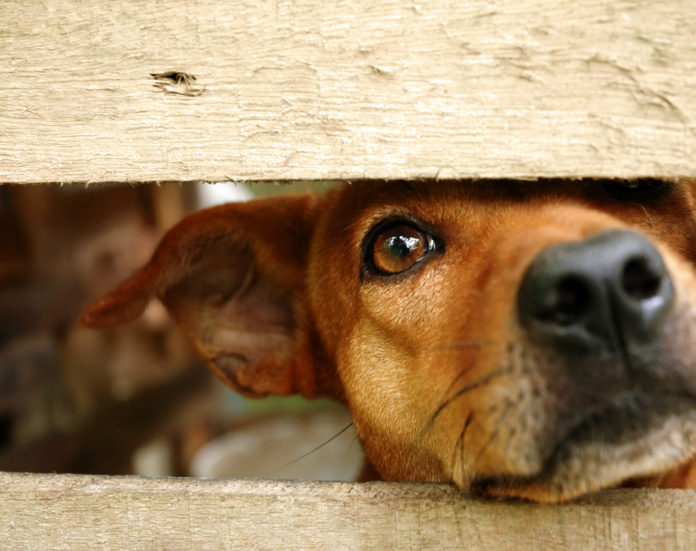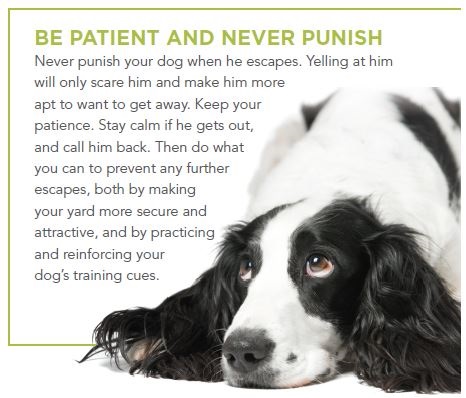Why does your dog keep escaping from the yard?

If your dog seems bent on escaping from your yard and running off, you need to figure out why, while finding ways to keep him happy inside the fence.
You let your dog out in the backyard to do run around and do his business. When you look out a while later, you spot him in the neighbor’s yard, or chasing rabbits in the field beyond your property. It’s not the first time this has happened. After calling him back, you inspect your fencing and discover your dog has dug a gaping hole under it at some point. Why did he do this, when your own yard seems so nice, and how can you stop him from escaping?
My own dog seems to be drawn to the outside world. Everything on the other side of the fence looks a lot more fun than what’s on the inside. “Dogs are social animals,” says dog behaviorist and author, Dr. Nicholas Dodman. “Hope for fun is on the outside. It’s as if there’s a magnet outside the fence.”
Two reasons why dogs want to get out
1. To escape from something
Some dogs have phobias of loud noises, especially thunderstorms. Frightened dogs will do anything to escape an enclosed space, and have been known to break through barriers when scared. If your dog is frightened of thunderstorms or other loud noises, such as road construction or transport trucks, keep him indoors with you and only take him out on the leash, even when your yard is fenced. Also be sure he has up-to-date ID so that if he does happen to escape and get lost, he has a much better chance of being found and returned.
2. To escape towards something
In many cases, dogs escape from their yards because there’s something outside that’s more alluring than their home territory. The top reason for escaping is to chase something. Some dogs are unstoppable, and have strong drives to chase, corner, or round up other creatures like squirrels, rabbits, deer, or even livestock. Other reasons for escaping the yard can include the allure of someone’s compost pile, or the sight of other dogs and people. If you have an unneutered male dog, he’ll be driven to wander away in search of a female dog in heat.
How to keep your dog from escaping the yard
Now let’s look at what you can do to make your dog’s home territory more interesting and exciting than anything outside it.
1. Don’t leave him alone in the yard for long periods
Some people think all they need to do to exercise their dogs is to let them out in the yard and then forget about them for an hour or so. The problem with this approach is that the backyard is very familiar ground to your dog. He may spend a few minutes running around the perimeter of the fence, sniffing the air, doing his business – and then what? He’s already bored, and there’s no one to play with. So he’ll either find a place to lie down and sleep until you let him in – or else he’ll try to get out, attracted by something more exciting happening beyond the fence. While it’s okay to let your dog out for a few minutes to do his business, as long as you keep an eye on him, you should stay outside with him if he’s going to be out for longer periods. That way, you can keep him entertained with your companionship or by playing fetch with him.
2. Create a fun environment
Creating an enriching outdoor environment for your dog can help stave off his runaway spirit. If life is fun at home, why leave? It makes sense to have plenty of things for your dog to do inside the fence. If feasible, have other dogs over for a play date. Add toys for him to play with, a sand pit for him to dig in, or a kiddie pool for him to splash in on hot days. Make sure that inside the area is a nice place to be for your dog so that the idea of escaping doesn’t cross his mind. Put out toys, sand pits or other forms of entertainment. You can even create mini-agility course or think up some fun games for him to play.
 3. Consider a solid fence
3. Consider a solid fence
Ideally, when you have a dog, it’s a good idea to have your backyard fully fenced in. A solid fence is better than a chain link fence, since your dog can’t see through it (or hopefully over it). Less visible access to the outside world means he’ll be less likely to want to get out. If possible, sink the fencing into the ground so that he can’t dig underneath it. Be sure to check the fencing on a regular basis and repair any loose or rotting boards. Make sure that gates are secure and locked.
4. Give your dog rewards
Your dog will enjoy staying in the backyard if he gets rewarded for being there. If you can’t be outside with him the whole time he is, keep him interested by going to the door every few minutes and calling him over for a visit, a pat on the head, and a favorite high-value treat. This will help keep him motivated to stick around.
Breeds differ on their desire to run off
Depending on your dog’s breed, or mix of breeds, he may have a stronger desire to escape than others. One person shared how her 13-year-old German Wirehaired Pointer had the strongest escape drive of her three dogs, even though the other two were younger and had more energy.
- Sporting breeds tend to be more hardwired to get away. It’s in their genes to “seek” out forms of enrichment or sport. That’s why they’re good at retrieving and hunting. Breeds such as hounds, Labs, terriers, and Rottweilers tend to love the chase.
- Other breeds like border collies and Australian shepherds need a job to do, and get bored and frustrated easily, especially if the yard at home has nothing in it to keep them occupied for more than a few minutes.
- Dogs also differ in their exercise needs. Breeds such as huskies and retrievers have much higher activity levels than pugs or Shih tzus, which means playing in the yard just isn’t enough to satisfy their needs and tire them out.
As an example of these differences between breeds, Dr. Dodman explains how he kept his own two dogs in his large backyard, which opened onto a wooded area. Both dogs loved to roam the woods. When he called them, they’d come back, but once in a while his coonhound, Jasper, would be on the trail of something and wouldn’t return right away. “If he got magnetized by an animal, he’d run away,” says Dr. Dodman. “Yet my other dog wasn’t like that.”
While there’s no guarantee your dog will never get out of your yard, creating a fun, stimulating and secure environment, while ensuring he isn’t left alone too long or exposed to loud scary noises, will really help encourage him to stick close to home.




